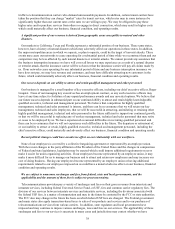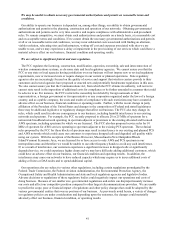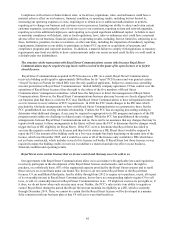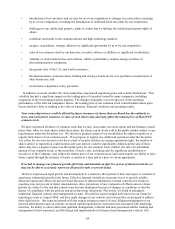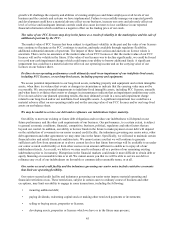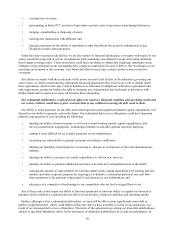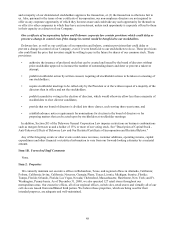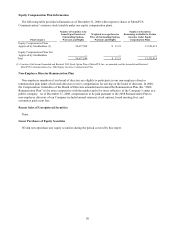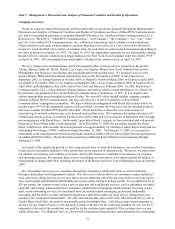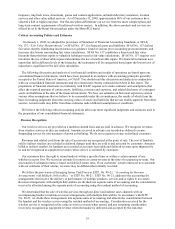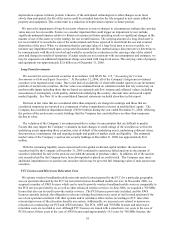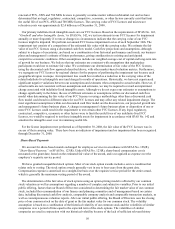Metro PCS 2008 Annual Report Download - page 56
Download and view the complete annual report
Please find page 56 of the 2008 Metro PCS annual report below. You can navigate through the pages in the report by either clicking on the pages listed below, or by using the keyword search tool below to find specific information within the annual report.47
addition, funding remains available under the revolving credit facility portion of the senior secured credit facility.
The more leveraged we become, the more we, and in turn the holders of our securities, become exposed to the risks
described above. Additionally, the secured creditors received a pledge of all of the equity of MetroPCS Wireless,
Inc., or Wireless, and of its existing and future direct and indirect subsidiaries, where most of our assets and all of
our operations and business results are generated and generally have a lien on all of the assets of Wireless and these
subsidiaries.
Settlements, judgments, restraints on our current or future manner of doing business or legal costs resulting
from pending or future litigation could have an adverse effect on our business, financial condition, and
operating results.
We are regularly involved in a number of legal proceedings before various state and federal courts and the FCC.
Such legal proceedings can be complex, costly, protracted and highly disruptive to business operations by diverting
the attention and energies of management and other key personnel. Also, changes in the law or legal interpretations
can affect the outcome of existing rules. The assessment of the outcome of legal proceedings, including our potential
liability, if any, is a highly subjective process that requires judgments about future events which are not within our
control. The outcome of litigation, including amounts ultimately received or paid upon settlement or other resolution
of litigation and other contingencies may differ materially from amounts accrued in the financial statements. In
addition, litigation or similar proceedings could impose restraints on our current or future manner of doing business.
Such potential outcomes could have a material adverse effect on our business financial condition, of operating
results, or ability to do business.
We are currently controlled by a limited number of stockholders, and their interests may be different from
yours.
A certain portion of the voting power of our capital stock is concentrated in the hands of a few shareholders some
of which are members of our board of directors. As a result, if such persons act together, they may have the ability
to significantly influence whether required consents can be obtained and may have substantial control over all
matters submitted to our stockholders for approval, including the election and removal of directors, changes in our
capital structure, governance, shareholder approvals and the approval of any merger, consolidation or sales of all or
substantially all of our assets. These stockholders may have different interests than the other holders of our common
stock and may make decisions that are adverse to your interests.
Our stockholder rights plan could prevent a change in control of our Company in instances in which some
stockholders may believe a change in control is in their best interests.
We have a stockholder rights plan, or Rights Plan. Pursuant to the Rights Plan, we have issued to our stockholders
one preferred stock purchase right for each outstanding share of our common stock as of March 27, 2007. Each
right, when exercisable, will entitle its holder to purchase from us a unit consisting of one one-thousandth of a share
of series A junior participating preferred stock at $66.67 per share. Our Rights Plan is intended to protect
stockholders in the event of an unfair or coercive offer to acquire our Company and to provide our board of directors
with adequate time to evaluate unsolicited offers. The Rights Plan may prevent or make takeovers or unsolicited
corporate transactions more difficult. The Rights Plan will cause substantial dilution to a person or group that
attempts to acquire us on terms that our board of directors does not believe are in our best interests and those of our
stockholders and may discourage, delay or prevent a merger or acquisition that stockholders may consider favorable,
including transactions in which stockholders might otherwise receive a premium for their shares.
Conflicts of interest may arise because some of our directors are principals of our stockholders, and we have
waived our rights to certain corporate opportunities.
Our board of directors includes representatives of certain of our significant stockholders. Those stockholders and
their respective affiliates may invest in entities that directly or indirectly compete with us, companies in which they
are currently invested may already compete with us, or companies in which we transact business. As a result of these
relationships, when conflicts between the interests of those stockholders or their respective affiliates and the
interests of our other stockholders arise, these directors may not be disinterested. Under Delaware law, transactions
that we enter into in which a director or officer has a conflict of interest are generally permissible so long as (1) the
material facts relating to the director’s or officer’s relationship or interest as to the transaction are disclosed to our
board of directors and a majority of our disinterested directors approves the transaction, (2) the material facts
relating to the director’s or officer’s relationship or interest as to the transaction are disclosed to our stockholders



